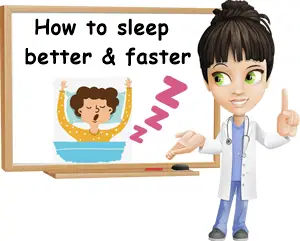Sleep is a necessity and one of the founding elements of good health. It impacts every system in the body, especially the nervous and immune systems. It supports learning and memory, promotes focus, alertness and fast response rates as well as strengthens the immune system. In order to be healthy, we need a lot of quality sleep which can only be achieved through perseverance and discipline.
This is because, often times, good sleep, plentiful and undisturbed, doesn’t come easy for many adults as everyday life, distractions and worries seem to somehow come in between a person and their resting hours.
Luckily, there are several tips you can practice starting now to help you get better, more restful sleep naturally and help you sleep through the night.

1) Stick to a sleeping schedule
Do you want to know how to sleep better and faster? Well, you can achieve better and faster sleep with the help of a sleeping schedule: going to bed and waking up at fixed hours. Although this is harder done that said. It can take a minimum of 2 whole weeks to adapt to a sleeping schedule, so the best moment to start is today. Make sure you give yourself half an hour time for falling asleep (although it might take a lot longer the first few times) and reserve about 9 hours of solid sleep. Try not to get frustrated if it takes you several hours to fall asleep and don’t go for your phone or remote control no matter how long it takes.
If you can manage to get on a sleeping schedule, you will get to the point you’ll wake up without the need for an alarm clock and feel energized, refreshed and more motivated to start the day. A good night’s sleep is the best secret to waking up with more energy in the morning and will help you be more productive, finishing off a great deal of your work in the first half of the day.
Adults may need an average of 7 to 9 hours of sleep a night, but don’t stress if you sleep less or more than this. How much sleep you need a night is really dependent on how tired you are physically and mentally and how healthy you are in general (some diseases like fibromyalgia or depression can create fatigue and require more rest).
2) Tips for falling asleep faster and staying asleep
No electronics before bed
Place your phone, tablet, television remote control and all electronics far away from the bed, out of hand’s reach. If you’re brave enough, remove all electronics from the room. This way you won’t reach for your phone the moment you get annoyed you haven’t fallen asleep and, well, you’ll have to sleep.
Sleep in darkness
Make sure the room is dark, so switch off computers, televisions, night lights and pull the curtains. You can also wear a sleeping mask. The dark helps you sleep sooner and get a more restful sleep because it triggers the body’s melatonin production. Melatonin is a hormone produced in the brain that regulates circadian rhythms or what is commonly known as biological clock – an internal mechanism that regulates processes that occur at 24 hour intervals, including the sleep cycle. Once you get used to going to sleep and waking up at fixed hours (so once you have a well established sleeping schedule), melatonin levels will regulate naturally.

3) Learn what not to eat and how not to eat
Eat three hours before you go to bed
This way, you will have digested everything by the time you lie down to sleep and you won’t experience acid reflux.
Keep dinners light
You can eat chicken instead of other heavier meats, but not fried (boiled, steamed or grilled chicken is best). Avoid eating cheese and other dairy at night. Avoid fried food, junk food and fast food (pizza included) as well as candy and baked goods. Eat some protein and carbs, with at least half your meal consisting of vegetables that don’t cause heartburn.
Choose rice over pasta
Usually, pasta is made with tomato sauces or white sauces containing butter, cheese and various condiments, all of which may prove heavy on the stomach and cause acid reflux at night. Rice on the other hand can be kept simple with chicken and vegetables and is thus satiating and won’t bother your stomach at all. If you do eat pasta, make sure to keep portions small (so don’t eat a big plate of spaghetti).
No spicy or heavily seasoned food at night
Just as important, avoid spicy foods and using lots of condiments in your meals in the evening (so no spicy peppers, no fresh ginger, not even turmeric if you’re sensitive to it, absolutely no wasabi, no onions or garlic) and don’t eat or drink anything acidic (citrus fruits, vinegar, soy sauce, lemon juice etc.).
Watch out for problematic foods
Both sweet and spicy peppers, canned beans and canned tuna, canned tomato sauce, heavy meats and oily fish, cold cuts, sausages, fries, even ginger and pineapple are some bad foods to eat at night.
4) Control stomach acidity (acid reflux)
If you suffer from acid reflux and heartburn, first of all, learn to avoid problematic foods like spices, chocolate, coffee, caffeinated tea, fried foods, oily foods, acidic foods and others. Also avoid eating fruits at night (except maybe for a ripe banana), especially fruits containing acids such as citric acid (in citrus fruit) or malic acid (apples). Find out what foods to eat and to avoid for acid reflux.
Secondly, see your doctor and get treatment. Usually, a several weeks-long course of proton pump inhibitors with antacids when necessary and eating cleaner, more healthy foods and lighter meals is everything you need to reverse your gastroesophageal reflux disease and sleep better.
When you have acid reflux, you feel a constant burning sensation in the chest or throat, stomach juices rising into the esophagus and experience bad, acidic or metallic taste in the mouth as well as a certain stomach discomfort that doesn’t allow for restful sleep. These are symptoms of acid reflux and once you learn to manage them, you will sleep continuously throughout the night and enjoy more energy when you wake up in the morning.
5) Warm bath and light stretching
Before you go to bed, have a warm bath or shower. Warmth is good on the muscles and circulation, relaxing tired muscles and boosting microcirculation for better sleep. A couple of minutes of stretching can provide additional comfort during sleep and ensure you rest well.
6) Take magnesium before bed
A simple magnesium supplement can do wonders for the muscles and brain and nervous system. Magnesium helps muscles relax, relieving physical tiredness and is calming on the nervous system, promoting relaxation and calm that favor sleep.
Magnesium is great for disposition, so if you are feeling too tired to sleep, to annoyed that you aren’t falling asleep fast enough or too worried about the next days, it’s the best natural remedy for helping you sleep. And you will wake up in the morning feeling refreshed, with no muscle aches or joint stiffness and feel energized.
There are OTC magnesium supplements with 150 mg and 300 mg of magnesium, and up to 450 mg and even 500 mg of magnesium that provide almost instant benefits. Taking magnesium always helps me sleep through the night and wake up refreshed and well rested the next day. See which magnesium form to choose for better sleep at night.
7) Try a soothing herbal tea
Chamomile, valerian, passion flower, St. John’s wort, calendula, Rooibos, lemon balm, lavender or peppermint are excellent soothing herbal teas to enjoy at night for a more restful sleep.
They are also known for their anti-inflammatory, soothing and anxiety-reducing properties. Discover 9 surprisingly effective anti-anxiety herbs.
A good tip for better sleep is to skip the lemon juice or lemon slice in your tea if you have gastritis or acid reflux and add some raw honey if you are not allergic to it. It’s important to avoid teas that contain caffeine like green tea, black tea and white tea – these varieties have plenty of caffeine which makes them counterproductive for sleeping because they stimulate the nervous and cardiovascular systems. Caffeine is known to produce side effects such as delayed sleep onset, cause insomnia, anxiety, which can also negatively impact sleep, and agitate.
Just as important, remember that herbal teas are a source of allergic reactions so check for allergies before trying a new tea. Chamomile and calendula, for example, are from the Asteraceae or daisy family and common allergens, and more likely to elicit allergic reactions in people with multiple food or pollen allergies, ragweed allergy or other daisy family allergies. If you aren’t the tea type, you can always put a couple of drops of lavender essential oil or another essential oil of your liking onto your pillow to help you sleep faster naturally.
Bonus tip for better sleep
Try cherry juice to help you get better sleep at night. Cherry juice has been scientifically proven to help increase sleep time, reduce muscle aches and pain which helps improve sleep quality, and provide melatonin for better sleep.
See more benefits of cherry juice for sleep.
What are your most effective tips for sleeping better, falling asleep faster at night and staying asleep all through the night?
